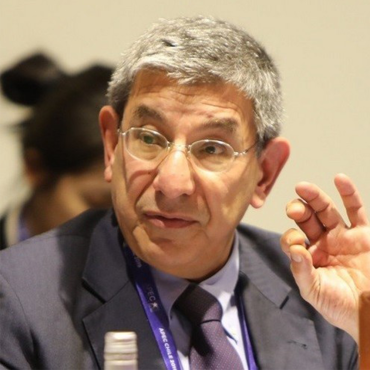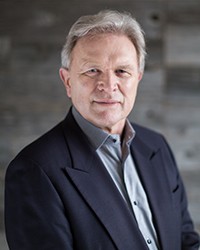The Asia Pacific Foundation of Canada serves as the secretariat for Canada’s National Committee for Pacific Economic Cooperation (CANCPEC). CANCPEC is one of 25 member committees in the Pacific Economic Cooperation Council (PECC), a non-profit international organization committed to the promotion of co-operation and dialogue to promote economic development in the Asia Pacific.
Founded in 1980, PECC is a tripartite network of 25 member committees comprising individuals and institutions dedicated to this shared mission. Of the 25 member committees, 22 represent the economies of Australia, Brunei Darussalam, Canada, Chile, China, Colombia, Ecuador, Hong Kong (China), Indonesia, Japan, Korea, Malaysia, Mexico, New Zealand, the Pacific Islands Forum, Peru, the Philippines, Singapore, Chinese Taipei, Thailand, the United States of America, and Vietnam. The PECC also has one associate member, France (Pacific Territories), and two institutional members, the Pacific Trade and Development Conference and the Pacific Basin Economic Council.
As the only non-governmental official observer of Asia-Pacific Economic Cooperation (APEC), PECC provides independent research input for the regional policy-making process.
In 2024-25, CANCPEC, in partnership with the Australian Pacific Economic Cooperation Council (AusPECC), undertook a project to draft recommendations to update the CPTPP’s e-commerce chapter (Chapter 14). Through a series of hybrid and virtual workshops with 25 regional experts, the team produced a joint report outlining pathways to make the agreement "fit for purpose" in an era of rapid digitalization – covering cross-border data flows, consumer protection, and cybersecurity.
The recommendations were delivered to the CPTPP Commission in November 2025 for consideration during the 2025 Commission Meeting.
For more information on our CANCPEC and PECC activities, email info@asiapacific.ca.

Current Members
CANCPEC Activities
2025
Meetings
The 32nd PECC Annual General Meeting (AGM): Seoul, South Korea – August 12, 2025
Under the theme “Reimagining Asia-Pacific Cooperation: Trade, AI, and Demographics in a Shifting Global Landscape” the PECC AGM convened four panel discussions: (1) Global Trade Landscape and World Economy; (2) AI and Advanced Technologies; (3) Responding to Demographic Change and Ensuring Sustainable Prosperity; and (4) Beyond 2025: The Way Forward for Asia-Pacific Regional Cooperation. Distinguished speakers of the AGM included remarks from Mr. Minseok Kim, Prime Minister of Korea, Mr. Han-koo Yeo, Trade Minister of Korea, and Dr. James Robinson, 2024 Nobel Prize Winner in Economics.

CANCPEC Chair Jonathan T. Fried speaks at the 32nd PECC Annual General Meeting in Seoul, South Korea
CANCPEC Chair, Jonathan T. Fried represented Canada on the first panel, analyzing the structural shifts in the global trading system caused by resurgent protectionism and the diminishing effectiveness of multilateral trade agreements. Mr. Fried’s remarks identified three megatrends of fragmentation, digitalization, and socialization, highlighting the significant implications of trade reconfiguration, and both technological and demographic transformation.
Read more on the 2025 PECC AGM here.
PECC Standing Committee Meeting: Seoul, South Korea – August 13, 2025
On August 13, the PECC Standing Committee meeting was held. In attendance were 20 youth ambassadors from Korea who presented their work on AI and demographic challenges, highlighting opportunities for APEC policymaking.

Canadian representatives (L-R) Momo Sakudo, Networks Officer, Asia-Pacific Economic Cooperation (APEC) Networks, APF Canada; Jonathan T. Fried, CANCPEC Chair; Sharon Sun, APF Canada Distinguished Fellow
The PECC Committees also discussed the PECC Yeouido Declaration and PECC work program updates. CANCPEC Chair, Mr. Fried, provided an update on the CANCPEC and AusPECC International Project on Modernizing Digital Trade: Updating the CPTPP’s Digital Trade Measures.
Read more on PECC’s Youth Engagement here.
Read the PECC 2025 Yeouido Declaration here.
PECC Signature Project Workshop: Seoul, South Korea – August 13, 2025
JANCPEC and KOPEC welcomed delegates to a Workshop on ‘Addressing Labor Shortages Due to Low Birth Rates and Aging Population in the APEC Region’. This PECC Signature Project was co-sponsored by CANCPEC, with Ms. Sharon Sun, APF Canada’s Distinguished Fellow, participating as the lead expert for Canada.

PECC Signature Workshop delegates in Seoul, South Korea
Alongside experts from Japan, Korea, China, and Chinese Taipei, Ms. Sharon Sun presented her commentary on “Successes and Failures of Cross-border Temporary Labour Migration Policies in Addressing Labour Shortages and Enhancing Economic Productivity.”
Jonathan T. Fried Appointed New Chair of Canadian National Committee for Pacific Economic Cooperation – May 2025
CANCPEC was pleased to welcome the appointment of Jonathan T. Fried to succeed Donald W. Campbell as Chair of CANCPEC, effective June 1, 2025. Mr. Campbell has served as Chair of CANCPEC since 2011 and was concurrently International Co-Chair of PECC from 2012 to 2020. Hugh Stephens will continue to serve as CANCPEC Vice-Chair.
Read the full press release here.
Current CANCPEC Projects
Track 1.5 Process to Review and Update the CPTPP Chapter 14 on Electronic Commerce – led by CANCPEC and AusPECC (Completed)
In November, AusPECC and CANCPEC delivered the final report on Modernizing Digital Trade which came out of the Track 1.5 Process to Review and Update the Comprehensive and Progressive Agreement for Trans-Pacific Partnership (CPTPP) Chapter 14 on Electronic Commerce (E-Commerce). The report includes 13 actionable recommendations to future-proof Chapter 14 by elevating it to the frontier of digital trade policy.
Activities in 2025 also included the following:
- February 2025: Second Virtual Roundtable for the Track 1.5 Process to Review and Update the CPTPP Chapter 14 on Electronic Commerce – Read out
- April 2025: Third Virtual Roundtable for the Track 1.5 Process to Review and Update the CPTPP Chapter 14 on Electronic Commerce – Read out
- April 2025: Presentation of theTrack 1.5 Process at the Second APEC Business Advisory Council in Toronto, Ontario
- November 2025: Delivery of Final Report to CPTPP Commission. Read the Final Report here.
Feature Publication:
Addressing Labor Shortages Due to Low Birth Rates and Aging Population in the APEC Region – led by JANCPEC and KOPEC, Co-sponsored by CANCPEC
APF Canada’s Distinguished Fellow, Sharon Zhengyang Sun, represented the Canadian National Committee for Pacific Economic Cooperation (CANCPEC) at a workshop hosted by Japan and Korea’s Pacific Economic Cooperation Council (PECC) committees focused on addressing labour shortages due to low birth rates and aging populations in the APEC Region. The workshop was held at the 32nd PECC general meeting in Seoul, South Korea.
As demographic pressures are increasingly impacting economic growth across APEC, Sharon presented insights from her commentary: “Successes and Failures of Cross-Border Temporary Labour Migration Policies in Addressing Labour Shortages and Enhancing Economic Productivity.” The commentary highlights lessons learned from Canada’s experience with the Temporary Foreign Worker Program and the International Mobility Program for APEC policymakers to consider when tackling this issue.
2024
Meetings
The 31st PECC Annual General Meeting (AGM) and High-Level Dialogue – August 2024:
Under the overarching theme of “The Role of Regional Cooperation in a Disrupted World,” the PECC AGM was held in Lima, Peru and convened five panel discussions. Donald Campbell, CANCPEC Chair, participated as a panellist for the fifth panel on “A World Disrupted: The Imperative of International Cooperation.”
The high-level dialogue on “The Role of Regional Cooperation in the Governance of Artificial Intelligence,” featured global experts on artificial intelligence where discussions were held on the benefits and risks of AI, AI governance, responsible AI frameworks and next steps for APEC.
The PECC Standing Committee Meeting:
CANCPEC was represented by Chair Donald Campell who presented on CANCPEC activities of 2024 which included gathering Canadian participants for PECC’s annual State of the Region Survey, and an Australia (AusPECC) led signature project on the Free Trade Area of the Asia Pacific (FTAAP). Current and future CANCPEC activities include co-sponsorship for the next phase of the AusPECC FTAAP pathways to prosperity project, co-sponsorship of a Japan and Korea led signature project on addressing labour shortages due to low birth rates and ageing populations, and a CANCPEC and AusPECC project for a Track 1.5 dialogue on the review of CPTPP Chapter 14 on electronic commerce.
Current CANCPEC Projects
Track 1.5 Process to Review and Update the CPTPP Chapter 14 on Electronic Commerce – led by CANCPEC and AusPECC
AusPECC and CANCPEC are jointly leading a PECC proposal to provide a set of recommendations to contribute to the Comprehensive and Progressive Agreement for Trans-Pacific Partnership (CPTPP) General Review for Chapter 14 on Electronic Commerce (E-Commerce). A key objective is to promote the enhancement of the e-commerce provisions of the agreement so that it can contribute to more collaborative, open and integrated economies across the Asia-Pacific region.
The project will provide a set of recommendations on how to enhance Chapter 14, drawing on the expertise across PECC member networks. The recommendations will be presented to the CPTPP Commission during Australia’s year as CPTPP Chair in 2025.
See the project proposal here.
Background
The Comprehensive and Progressive Agreement for Trans-Pacific Partnership (CPTPP) is a free trade agreement between 11 economies in the Asia-Pacific: Australia, Brunei Darussalam, Canada, Chile, Japan, Malaysia, Mexico, New Zealand, Peru, Singapore and Vietnam. To ensure that the CPTPP remains of the highest possible standard, and its disciplines continue to be relevant to trade and investment issues, CPTPP members have agreed for the general review of the CPTPP to begin in 2024 under the chairmanship of Canada, and to continue with Australia as chair in 2025.
The review provides an opportunity to review and update Chapter 14 on E-Commerce - an area which has undergone rapid advancements in digitalization and e-commerce over the last decade. A PECC multistakeholder review can provide recommendations to ensure the agreement promotes interoperability and new 'gold standards' for the region. Recommendations can also inform existing Free Trade Agreements and digital trade frameworks to identify best practices.
Timeline:
October 2024: Invitation to PECC network to nominate digital experts
November 27, 2024: Hybrid Roundtable for the Track 1.5 Process to Review and Update the CPTPP Chapter 14 on Electronic Commerce (completed)
Find the event read-out here.
PECC Publications
About Publications
To meet PECC's objective to promote economic cooperation and the idea of a Pacific Community, PECC undertakes research on salient issues in the region. PECC brings together thought leaders from business, government, the research community and civil society and its multistakeholder approach brings a wider range of views to bear on the pressing issues of the day.
Find All Past PECC Publications here
PECC Signature Project: State of the Region Report
Since 2009, PECC conducts an annual survey on the State of the Region to gauge regional views on issues affecting Asia-Pacific economic cooperation.
2025
PECC Newsletters
2025
Read the PECCLink Newsletter for more details on PECC's 2025 activities
PECC Press Releases
2020
2017
All Releases
Find All Past PECC Press releases here
About PECC
About
PECC's first meeting (PECC I), which was then called "the Pacific Community Seminar", was held in September 1980 in Canberra, Australia, at the initiative of Mr. Masayoshi Ohira and Mr. Malcolm Fraser, then Prime Ministers of Japan and Australia.
The meeting called for the establishment of an independent, regional mechanism to advance economic cooperation and market-driven integration. A vital characteristic of the new body was its independent, unofficial status which would permit it to address economic issues and measures free from constraints of formal governmental policies and relationships. It, hence, agreed on the need for an informal process involving business and independent research institutions alongside governments.
Since its establishment, PECC has been a unique tripartite partnership of senior individuals from business and industry, government, academic and other intellectual circles. All members participate in their private capacity and discuss freely on current, practical policy issues of the Asia Pacific region. Currently composed of 25 member committees, is the only non-government official observer of APEC and has provided information and analytical support to APEC ministerial meetings and working groups, facilitating private sector participation in the formal process.
PECC Objective: Aims to serve as a regional forum for cooperation and policy coordination to promote economic development in the Asia-Pacific region, based on the following premises:
- 1. The respective strengths of business and industry, government, academic and other intellectual circles can be better focused to promote the acceleration of economic growth, social progress, scientific and technological development and environmental quality in the region.
- 2. Trade, joint ventures, mutual aid and other forms of linkage, when developed in a spirit of partnership, fairness, respect and genuine cooperation, strengthen the foundation needed for a prosperous, progressive and peaceful Asia Pacific region.
Read more about PECC here





